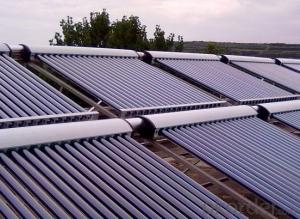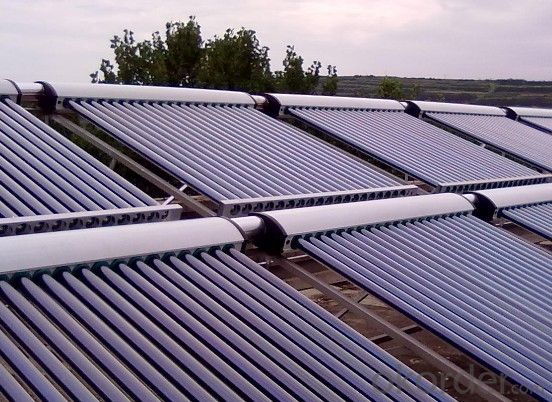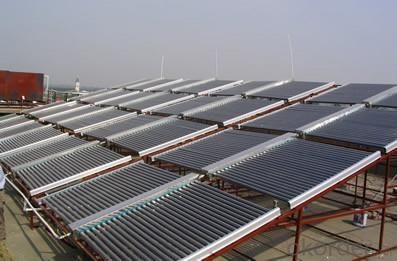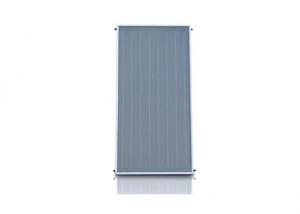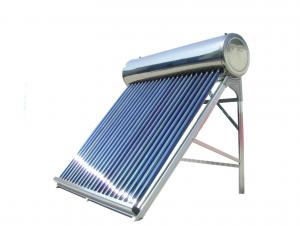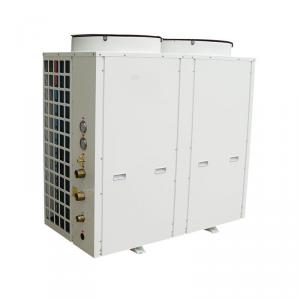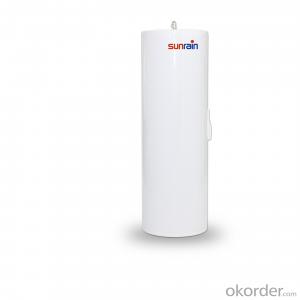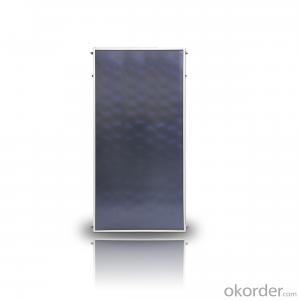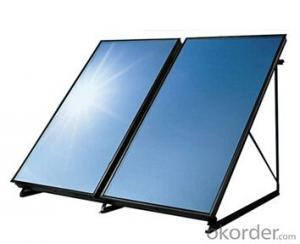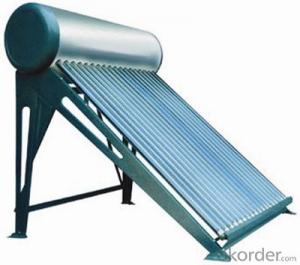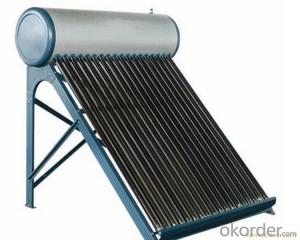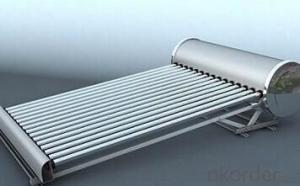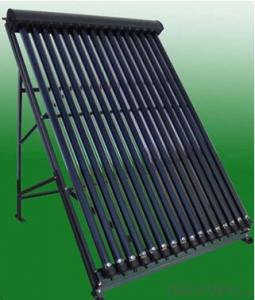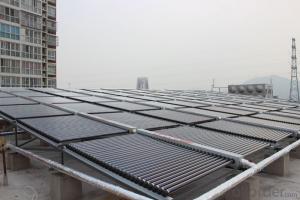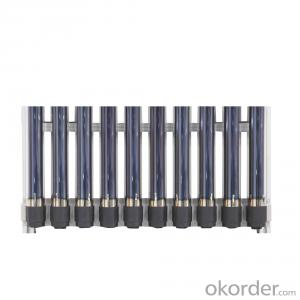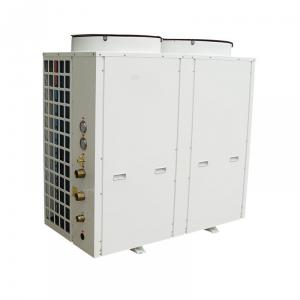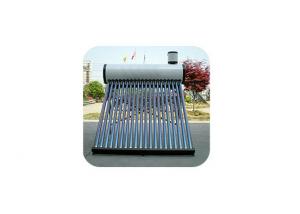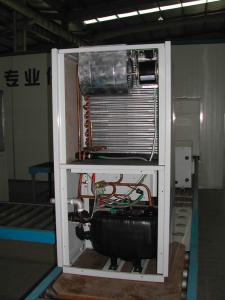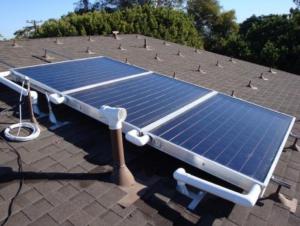High Quality 150L Solar Water Heater with Aluminum Alloy Frame - Solar Water Heater Manufacturer
- Loading Port:
- China main port
- Payment Terms:
- TT OR LC
- Min Order Qty:
- 10 set
- Supply Capability:
- 10000 set/month
OKorder Service Pledge
OKorder Financial Service
You Might Also Like
Solar water heaters features
1. The upright tank can make the water temperature to a high level. It can hot the water instantly
2. The tank inside the building, the hot water loses less energy than the normal one
3. The solar collector and the tank of solar water heater is separated, that makes the system combine with the building perfectly, which will reduce the sightseeing for the building and environment around
4. Back up with electric heater so that in the day without sunshine hot water can also be used
5. Can be combined with gas or electric heater
6. Max. Pressure: 12bar; Operating Pressure: 6 bar
7. It can be used for other function, such as warming
Solar water heaters working principle
1. The solar collector absorbs solar energy and transmits it to the solar water heater tank through circulation
2. When the temperature of the collector reaches the set value, the controller starts the circulation pump automatically
3. The circulation pump makes heat-conducting liquid circulate automatically
4. The heat-conducting liquid transfers heat to water by lower heat exchanger in the water tank.
5. When the temperature difference between solar collector and heat pipe solar water heaters tank doesn't reach the set value, the circulation pump will be shut automatically
6. In case the temperature of the water tank does not reach Tmax, Electric Heating Element will start to work automatically
Solar water heaters working station component:
1. Operating screen
2. Manometer
3. Pump speed adjust switches
4. Temperature difference circulation pump
5. Flow rate indicator
6. Return circuit connector
7. Safety valve
8. Expansion vessel connector9. Return circuit connector
10. Wall mounting
11. Expansion vessel:8L
12. Pressure resistance: 10 bar pressure for expansion vessel
Solar water heaters specification:
Description | solar water heaters |
Material of out manifold | 0.55mm thickness color steel/ fluorine carbon steel |
Material of inner tank | Food grade 2.0 mm thickness SUS304 stainless steel |
Tank insulating layer | 40mm 45kg/m³ high-density polyurethane foamed |
Inlet and outlet hole | Male G1'' |
Max pressure | 0.6 Mpa |
Solar collector tube | 3.3 Borosilicate glass with N/Al coating |
Thickness of glass tube | 1.6mm |
Vacuum tube tightness | P≤0.005 Pa |
Absorption | as=0.93-0.96 (AM1.5) |
Emission ratio | εh=0.04-0.06 (80C±5C) |
Idle sunning property parameters | Y=220~260m2.C/KW |
Average heat loss coefficient | ULT=0.6~0.7W/(m2.C) |
Bracket: | 2.0mm thickness aluminum alloy |
Tank weight | 75KGS |
Tank size | 560mm Dia x 1810mm Height |
Tank capacity | 300L |
Solar collector | 2pcs 58x1800x15tube solar collector |
Absorber area | 2.811 m² |
Working station | SP116 working station |
Heat exchanger length | Upper:12m, Underside:18m |
Solar water heaters details show:
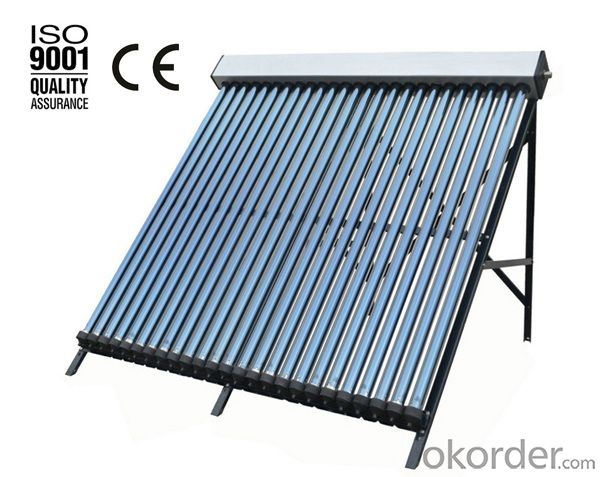
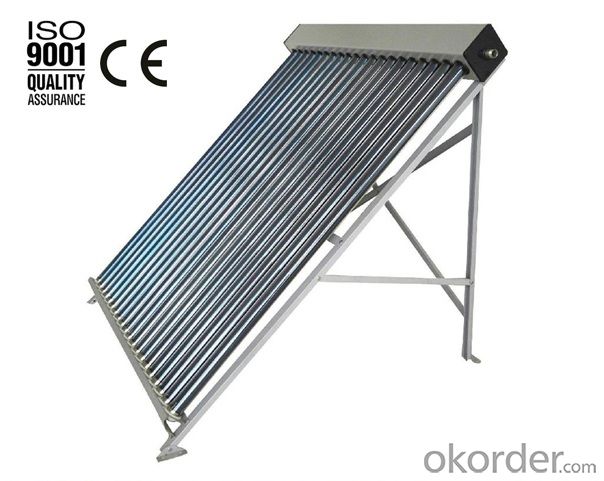
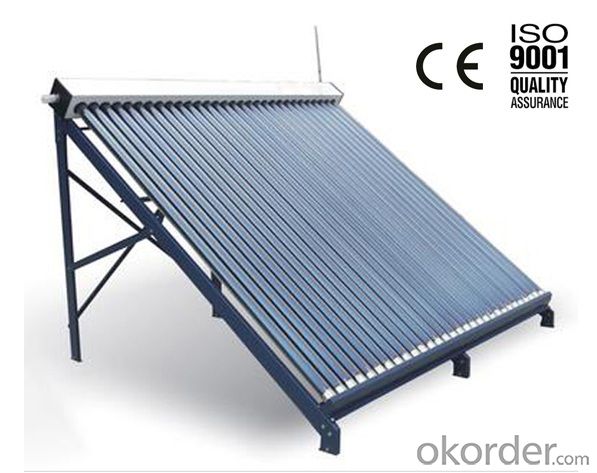
Benefits of this kind of solar water heaters:
1. Prolong the life of your existing water heater
2.Costs less than an electric, gas or oil water heater
3.No maintenance required
4.Lasts longer than a traditional hot water heater
5.Reduce your water heating costs
- Q: Can a solar water heater be used to heat a swimming pool?
- Yes, a solar water heater can be used to heat a swimming pool. Solar water heaters use the sun's energy to heat water, and this heated water can be circulated through the pool's heating system, effectively warming the pool. This is an eco-friendly and cost-effective method of heating a swimming pool.
- Q: What is the expected lifespan of the backup heating element in a solar water heater?
- The expected lifespan of the backup heating element in a solar water heater can vary depending on factors such as the quality of the element, usage patterns, and maintenance practices. On average, a well-maintained backup heating element can last anywhere from 5 to 10 years.
- Q: What is the impact of water pressure on the performance of a solar water heater?
- The impact of water pressure on the performance of a solar water heater is significant. Higher water pressure allows for better circulation of water through the system, ensuring efficient heat transfer and faster heating of the water. It also helps to maintain a steady flow of hot water from the heater to the tap. However, excessively high water pressure can put strain on the system, potentially causing leaks or damage to the components. Therefore, it is important to ensure that the water pressure is within the recommended range for optimal performance and longevity of the solar water heater.
- Q: Can a solar water heater be used in areas with high levels of water hardness?
- Yes, a solar water heater can be used in areas with high levels of water hardness. However, it is important to note that the high mineral content in hard water can lead to mineral buildup and scaling on the surface of the solar collector and pipes. This can reduce the efficiency and performance of the system over time. Regular maintenance and periodic cleaning are necessary to prevent or remove mineral deposits and ensure optimal functioning of the solar water heater in such areas.
- Q: Are there any tax credits available for installing a solar water heater?
- Yes, there are tax credits available for installing a solar water heater. The Federal Investment Tax Credit (ITC) allows homeowners to claim a credit of 26% of the installation cost on their federal taxes. State and local incentives may also be available, making it a cost-effective option for homeowners interested in renewable energy.
- Q: Can a solar water heater be used in areas prone to wildfires?
- Indeed, areas prone to wildfires can use solar water heaters. It is noteworthy that solar water heaters do not pose any direct fire risk themselves, unlike traditional heaters that depend on gas or electricity. Solar water heaters rely on the sun's energy, making them inherently safer in wildfire-prone regions. Nonetheless, it is crucial to consider overall safety measures and precautions when installing and operating a solar water heater in such areas. Here are some important points to consider: 1. Professional installation: Ensure a qualified professional installs the solar water heater, following all safety guidelines and regulations. The system should be securely anchored to prevent damage during high winds or wildfires. 2. Regular maintenance: Regularly inspect and maintain the system to ensure optimal performance. This includes cleaning, checking for leaks, and ensuring all components function properly. 3. Fire-resistant materials: Utilize fire-resistant materials, such as metal or concrete, for mounts, plumbing connections, and storage tanks associated with the solar water heater system. This reduces the risk of fire ignition or spreading. 4. Clear vegetation: Maintain a clear area around the solar water heater, removing dry vegetation or flammable materials that could fuel a fire. 5. Adequate insurance coverage: Ensure your homeowner's insurance policy covers solar water heaters and associated risks in case of wildfire or other damage. Staying updated with local regulations and guidelines regarding the use of solar water heaters in wildfire-prone areas is important. By following these safety measures and taking appropriate precautions, it is possible to safely use a solar water heater in such regions, providing an environmentally friendly and cost-effective method to heat water.
- Q: What is the role of the solar water heater's reflector
- The sun light in order to better use of resources, using the reflection plate will be missing from the two middle tube reflect sunlight to heat the nightside, improve the heat absorption tube.
- Q: Can a solar water heater be used in areas with high levels of saltwater or corrosive environments?
- Solar water heaters can indeed be used in areas with high levels of saltwater or corrosive environments. However, it is imperative to choose a solar water heater that is specifically designed for such conditions. This is because standard solar water heaters may be prone to corrosion caused by the saltwater or other corrosive elements found in these environments. To ensure the durability and effectiveness of a solar water heater in areas with high saltwater or corrosive environments, it is advisable to opt for models that incorporate corrosion-resistant materials like stainless steel or specially coated tanks and collectors. These materials possess greater resistance against the corrosive effects of saltwater and other corrosive elements, thereby guaranteeing the longevity and efficiency of the solar water heater. Furthermore, regular maintenance and cleaning are essential in these environments to eliminate any salt deposits or corrosive substances that might accumulate on the solar water heater. By doing so, the lifespan of the system can be extended, and its performance can be optimized. By specifically selecting a solar water heater designed for high saltwater or corrosive environments and implementing proper maintenance practices, it is feasible to successfully harness the advantages of solar water heaters in these areas.
- Q: What is the best location for installing a solar water heater?
- The best location for installing a solar water heater is a spot that receives ample sunlight throughout the day, preferably on the south-facing side of a building or roof. It should be free from shading caused by trees, buildings, or other obstructions to maximize solar energy absorption. Additionally, the location should have easy access to plumbing and be in close proximity to the water storage tank or hot water distribution system to minimize heat loss in transfer.
- Q: What happens to a solar water heater during a power outage?
- During a power outage, a solar water heater will stop functioning as it relies on electricity to circulate the water and control its temperature. Without power, the system cannot continue to heat or distribute hot water.
Send your message to us
High Quality 150L Solar Water Heater with Aluminum Alloy Frame - Solar Water Heater Manufacturer
- Loading Port:
- China main port
- Payment Terms:
- TT OR LC
- Min Order Qty:
- 10 set
- Supply Capability:
- 10000 set/month
OKorder Service Pledge
OKorder Financial Service
Similar products
Hot products
Hot Searches
Related keywords
